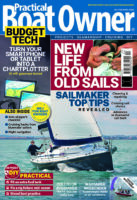No engine, 10-knot tides and the fear of becoming Russian target practice keeps Adrian Flanagan on his toes as he traverses the Aleutian Trench
No engine, 10-knot tides and the fear of becoming Russian target practice keeps Adrian Flanagan on his toes as he traverses the Aleutian Trench.
‘This is a tricky area I am in, positioned over the Aleutian Trench which runs east-west south of the Aleutian Island chain, plunging to depths of 9,000 meters and rising to shoal depths around the islands themselves in the space of less than 60 miles. With the waters driven by winds from the south-west towards the islands but with nowhere to go, the potential for massive seas is an ever present danger.
‘The famous Japanese yachtsman, Kenichi Horie after making an east to west transit of the North West Passage in 1974 was rolled twice south of the Aleutians and limped, badly damaged into Hawaii. David Scott Cowper also made a transit of the North West Passage under power in his converted lifeboat, Mabel E Holland. When leaving Dutch Harbour on Unalaska Island en route towards Australia, he was caught in tremendous, confused seas but managed to weather his way clear. So, I am somewhat apprehensive. My approach has been cautious. I decided that I would pass the islands at the widest point available between the westernmost of the Aleutians, Attu Island and Ostrov Medynn on the Russian side of the US-Russian boundary line which bisects the two. Matters are complicated by Stalemate Bank which lies west of Attu Island and shallows to a mere 30 meters depth.
‘The problem has been in the angle of approach. The great promontory of Poluostrov-Kamchatka which dangles from the mass of the Russian mainland like an accusatory finger pointing at Japan deflects the low pressure systems eastwards then north-eastwards. Caught in the lee of Poluostrov-Kamchatka can mean wind starvation as the systems pass south and east. To avoid this, I have crept eastwards. The trick is not to go so far as to get east of what I have called “Stalemate Pass” otherwise it could mean a beat to get back on line. It is also a question of waiting for the right winds in terms of both strength and direction before attempting the pass.
‘I am now 80 miles southwest of Stalemate Bank. The distance of the pass itself is 100 miles. I feel like a leopard hunkered down in the long grass stealthily inching forwards. Winds are light, the main set at second reef, barely any headsail flying. I am trying to hold Barrabas’s bows high to the wind but with minimal boat speed while I sit out the next 36 hours and wait for southwest winds of 12 knots which will take me through the pass on a downwind run.
‘My anxiety is compounded by the lack of an engine. Rip tides running at ten knots can easily occur if conditions are misjudged. Unlike the leopard, I am not after prey, rather my mission is to steal past the islands without being noticed lest their watery tongues lick me in towards their rocky jaws.
‘Entering Russian waters, I advised the Maritime Rescue Coordination Centre (MRCC) at Vladivostok. They informed the United States Coastguard (USCG) at Juneau who then called Barrabas. I spoke with the efficient, charming and delightfully voiced Lt Miller (female – first name unknown at this time) who had ‘googled’ “Barrabas” and so knew all about us and the problem with the shaft. Between us, Lt Miller and I tried to decipher the email in broken English which Vladivostok had sent Juneau.
The words ‘shot’, ‘range’ and a 30-mile warning led me to believe that there might be a firing range on Ostrov Medynn. The idea of some rookie Russian artilleryman eyeing Barrabas through binoculars and declaring enthusiastically while he loads up his shells that a yacht has been set up as target practice, didn’t fill me with feelings of euphoria. The ever-courteous Lt Miller agreed to converse with Vladivostok and find out more. A couple of hours later, she called again to inform me that there was not a firing range but a protected area reservation extending 30 miles offshore from Ostrov Medynn.
‘The USCG is, in my opinion an outstanding organization. Their personnel proved it while I nursed Barrabas in towards Honolulu, insisting on a communications schedule and checking on me even after mooring up at the Waikiki YC, and the proactive response from Juneau has lifted my confidence. I will shortly pass from Russian to US territorial waters.
‘Should anything untoward happen, the idea of being in the capable hands of Lt Miller and her colleagues substantially ameliorates the anxiety.’
For full expedition details including news, position maps and photos, please visit: www.alphaglobalex.com



